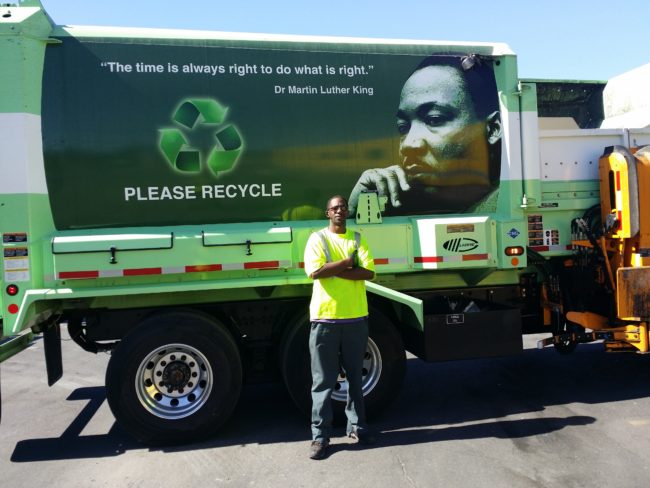
Kamarlo Spooner is putting together a nonprofit to help people coming out of prison become garbage truck drivers.
When considering work after prison, driving a garbage truck might not be the first job that comes to mind. But maybe you should consider it. This type of work can provide excellent pay and an opportunity for union membership with all of its benefits. And in many cases it might mean a schedule that allows time for other interests and commitments.
Just ask Kamarlo Spooner, who worked his way into a garbage truck driving job after being incarcerated and hopes to help others like him get a similar opportunity.
Spooner actually started seriously preparing for employment during his three years of imprisonment for drug sales and firearms convictions.
“In the prison, they had different programs. I got really good in carpentry, welding and auto mechanics. I wanted to prepare for a job,” he says.
Spooner found truck driving more suitable job than carpentry
Spooner used the carpentry skills he developed while incarcerated to land an apprenticeship position with a builder. But he was only making $12 per hour and needed more money to support his family. So he picked up the handbook for commercial truck driving, studied it during his lunch periods and managed to pass the test for a Class A permit.
Without a license yet, Spooner couldn’t get the type of job he wanted. “I finally found a company that would give me a job. They allowed me to drive Class B trucks, and I had a certain amount of time to get my Class A license. I would have to join the Teamsters Union. They let me practice on the company truck when I wasn’t working. Every Saturday and Sunday morning I went in at 2 a.m. and practiced driving the commercial vehicles. I taught myself on the weekends and on weekdays went to work on 10 hour shifts,” Spooner says.
His pay went from $12 per hour as a carpenter to $22 per hour with benefits at the truck driving job, He worked there for three years and at another truck driving company for another three years, before applying for a job with Waste Management in a San Francisco suburb, where six years later he’s still employed.
A typical day for Spooner? He reports to work at 5:15 a.m., sits in on a brief safety meeting, then does a pre-trip walk around the truck to make sure everything is OK. Then it’s off on his route to collect recyclables, using a joystick to operate the arm that picks up the garbage containers on the curbside and dumps their contents in the truck.
Spooner makes more than $100,000 per year. Although he likes his job, that’s not what he ultimately wants to do.
Wants to help others have opportunities driving a garbage truck
“What I really want to do is to get paid to get out and encourage other folks – basically, what I do now for free,” he says.
During the time he was incarcerated, Spooner decided that when he was released he would go back and help inmates prepare to get on their feet when they get out. But the prisons he talked to weren’t interested. Finally, the Sierra Conservation Center in Jamestown, Calif., where he was incarcerated for almost two years, allowed him to come in and talk to the inmates.
That was the beginning. Spooner has continued his education. He now has five associate degrees and speaks to formerly incarcerated individuals as part of Peralta Community College District’s New Degree program to encourage them to go to community college.
Plans to create nonprofit to train garbage truck drivers
Beyond that, Spooner is in the process of putting together a nonprofit that will help previously incarcerated people get their commercial driver’s license (CDL), train them to operate a trash truck and create a pipeline of qualified drivers to offer trash companies.
And how exactly does he plan to do this? His idea is to recruit formerly incarcerated individuals who are living in the many homeless camps in Oakland and other parts of Alameda County in the San Francisco Bay Area.
He will help them get their commercial license and GED, train them to drive a garbage truck and pay them while they’re doing it. The garbage truck will pick up trash from the various homeless encampments. Spooner also plans to work with the city of Oakland and Alameda County to have his trainees clean up areas where protests have taken place.
“After a couple of years, they’ll be trained on how to operate a commercial truck, have a GED and get a commercial truck driver’s license,” Spooner says. “If these individuals do well at my organization, I’ll have a pipeline so after two years they can get a job at another company.”
While his nonprofit is still in the planning stages, Spooner has already been approved for tax-exempt status as a nonprofit by the state of California and is in the process of filling out the federal forms to become a 501(c)(3) nonprofit organization, the Kamarlo Spooner Foundation.


